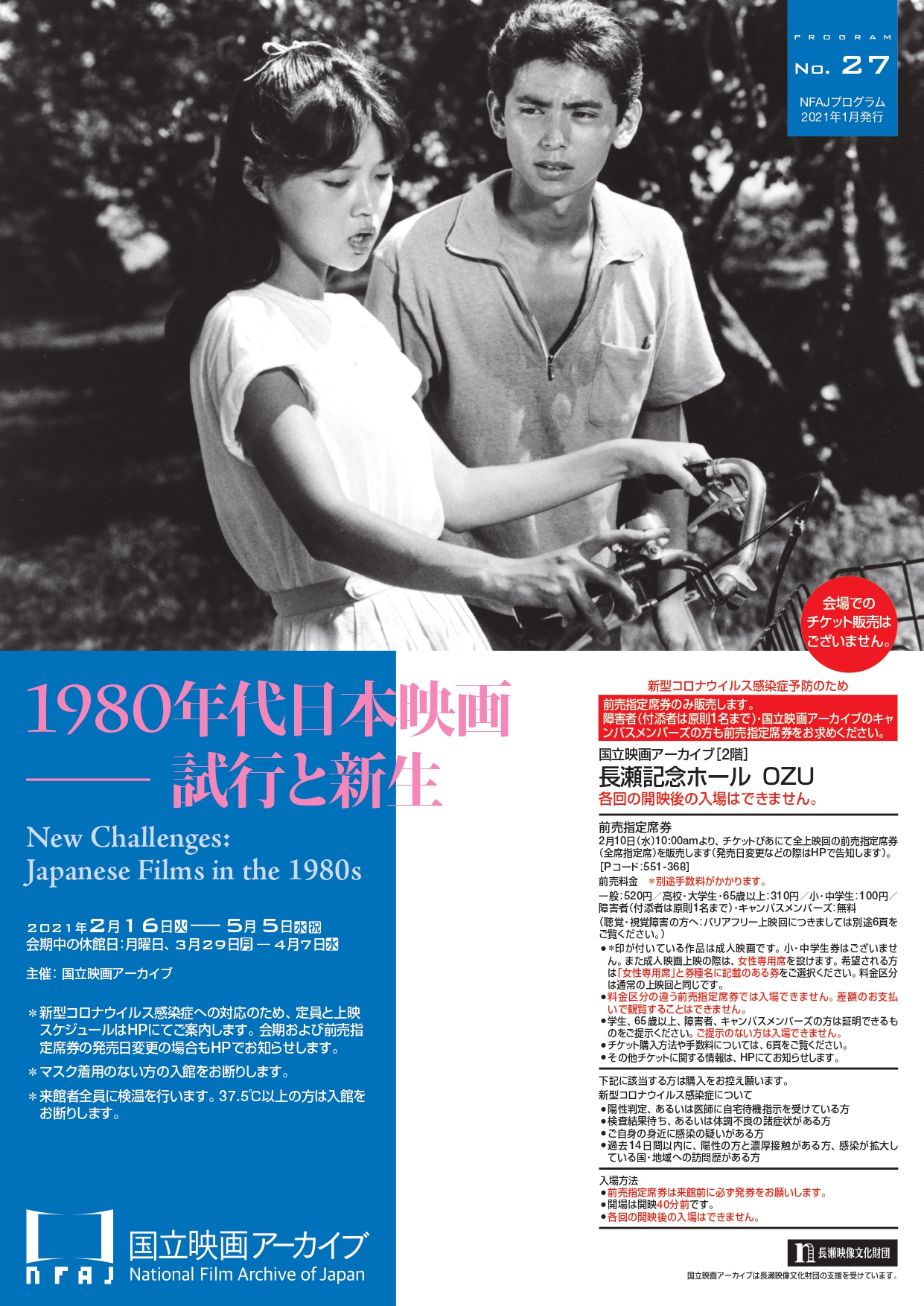
The National Film Archive of Japan will hold a special screening of "1980s Japanese Films: Trial and Rebirth" from February 16th (Tuesday) for about two and a half months.
In the 1980s, Japan became an economic powerhouse and a consumer society arrived. Various changes have come to the movie. While the trend toward blockbusters that began in the 1970s became even more prominent, idol movies and animations for young audiences became a hit, new companies and productions participated in movie making, and above all, new talents made their debut one after another. .. It can be said that these structural changes in the film industry have been significant to this day.
Based on the recent "Contemporary Japanese Film Directors" series held by the museum and special features of film producers such as Shiro Sasaki and Mitsuru Kurosawa, this project has become a hot topic in society as well as works that show the new trends of the times. This is an attempt to look back on Japanese films from the 1980s with a total of 44 works (42 programs). Through a variety of movies, the lineup reveals the times. Please take a look at the works of this period, which is the origin of contemporary Japanese cinema.
(Note that the measures to prevent the spread of new coronavirus infections at the time of the event may change, so please check the website at any time.)
- The highlight of the project
A hit work that remains in the history of Japanese movies, a topical work that has become a social phenomenon <br /> The blockbuster work "Antarctic Story" (1983, Ikoka Modoroka), which broke the distribution record of Japanese movies at that time, and tax exemption with a national tax inspector "Take Me Out to the Snow" (1987, Yasuo Baba), which led the ski boom, "Woman of Marsa" (1987, Juzo Itami), which drew a confrontation with a person and caused a fashion phenomenon, and best-selling novels The bizarre fantasy "Teito Monogatari" (1988, Akio Jitsuoji), which was made into a movie and reproduced Ginza in the Taisho era as an open set, and "Ikokamo" starring Akashiya Sanma and Otake Shinobu, who were hot topics in the TV drama co-starring. "Doroka" (1988, Jiro Ikuno) will be screened.
Pay attention to the young works of the masters
In the 1980s, a new generation of directors made their debut and revitalized Japanese cinema. Shinji Somai "Tonda Couple" (1980), Yoshimitsu Morita "Something Like It" (1981), Kiyoshi Kurosawa "Kandagawa Pervert War" (1983), Junji Sakamoto "Dotsuitarunen" (1989), Suo Please pay attention to the youthful early works of the masters who led the subsequent Japanese movies, such as Masayuki Suo's "Fancy Dance" (1989).
Actors and idols who fascinated the times <br /> Yuko Matsuda "Heat Shimmer" (1981, Seijun Suzuki), Masako Natsume "Onimasa Hanako's Life" (1982, Heroes of Five Companies), Yuko Tanaka "Amagi Pass" (1983, We will take up literary works that bring out the charm of actors such as Haruhiko Mimura). In addition, Hiroko Yakushimaru "Tonda Couple" (1980, Shinji Somai), Noriko Watanabe "Sunny, Occasionally Murder" (1984, Kazuyuki Izutsu), Tomoyo Harada "Early Spring Story" (1985, Shinichiro Sawai) was screened. In addition, "Onyanko the Movie Crisis Ippatsu!" Was produced as the popularity of the Onyanko Club, which was formed in 1985, increased. (1986, Masato Harada), and the critically acclaimed male fighting group starring "Rock, Quiet Flow" (1988, Shunichi Nagasaki) will also be screened.
New developments in animated films
In the 1980s, the popularity of theatrical animation, which continues to this day, became established, and the artistry was strongly emphasized, breaking new ground. "Jarinko Chie" (1981, Isao Takahata), "Macross: Do You Remember Love?" (1984, Noboru Ishiguro, Shoji Kawamori), "Mobile Suit Gundam Char's Counterattack" (1988, Yuuki Tomino) , "Kiki's Delivery Service" (1989, Hayao Miyazaki), etc. can be viewed on a 35mm film.
Ambitious works of masters <br /> Directors who produced program pictures at major movie companies will also respond to the new developments of the times and create innovative works in an independent environment. "Mr. Mrs. Miss Lonely" (1980, Tatsumi Kumashiro), "Heat Shimmer" (1981, Seijun Suzuki), "The Living Koheiji" (1982, Nobuo Nakagawa), "The Living is a Flower Please see the experimental works of skilled directors, such as "If you die, until then, Party Declaration" (1985, Higashi Morisaki).
- Planning details
1980s Japanese Film-Trial and Rebirth
Dates: February 16th (Tuesday) -May 5th (Wednesday / holiday) * Closed: Monday, March 29th (Monday) -April 7th (Wednesday)
Venue: National Film Archive Nagase Memorial Hall OZU [2nd floor]
Capacity: 155 seats (accommodation rate 50%)
HP: https://www.nfaj.go.jp/exhibition/japanese1980s202101/
Inquiries: 050-5541-8600 (Hello dial)
Advance reserved seat ticket [P code: 551-368]
Advance reserved seat tickets (all reserved seats) for all screenings will be sold at Ticket Pia from 10:00 on February 10 (Wednesday).
▷ General: 520 yen / High school / university student / 65 years old and over: 310 yen / Elementary / junior high school student: 100 yen /
Persons with disabilities (up to 1 attendant in principle) ・ Campus members of the National Film Archive of Japan: Free
* Only advance reserved seat tickets will be sold.
* Tickets will not be sold at the venue.
* Persons with disabilities (up to one attendant in principle) and campus members are also required to purchase advance reserved seat tickets.
* The session and the sale date of advance reserved seat tickets are subject to change. We will notify you of any changes on our website.
